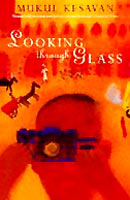This book is beautifully written, funny and also sometimes crafty. The novel`s only real flaw is its meandering story line. Some events of the narrator`s life seem to have no real purpose and no goal. This is an unusual and entertaining novel with layers of meaning throughout the story. This is not a typical history book. It is meditation in which the author takes the reader on an odyssey through the events and times that were India`s trial by fire. This work is much more an experience than just a book.
Mukul Kesavan is an prolific Indian writer. He teaches social history in Delhi at Jamia Milia Islamia and writes fiction when he can. He`s keen on the game of cricket but he usually doesn`t play. His credentials for writing about the game are founded on a spectatorial axiom: distance brings perspective. His first novel `Looking Through Glass` was a bestseller some years back. He is also the co- editor of Civil Lines, the journal of new Indian writing, and an essayist of some prominence. His columns have appeared in The Telegraph, CricInfo and Outlook Magazine as well.
Synopsis:
 `Looking Through Glass` is a book by Mukul Kesavan. This is an amazing story by the author, which was his first creation. The nameless narrator of this novel, is a modern young photographer on route to deposit his grandmother`s ashes in the Ganges when he falls from the Mail Train and lands in 1942. Pretending amnesia, he is taken in by a Muslim family. The family comprises of three members that includes a young revolutionary, Masroor, his sister Asharfi and Ammi. Ammi is their mother who is waiting for her husband who disappeared some years before on a Haj, the famous pilgrimage to Mecca. At first terrified, our narrator refuses to stir from the house, in fear he may change history, until finally he is impelled out of doors by the discovery that he has head lice. It`s the day of the Quit India Resolution, voted by the new Indian Congress; a result that Masroor has feared because he believes it will lead to partition of the country between Hindus and Muslims. Taken by Masroor to a barber, the hapless narrator is immediately embroiled in Indian politics when he is the only witness to Masroor`s disappearance - into the recruiting poster on the side of an army truck. The author beautifully combines magic realism and outright farce comedy in an energetic, even frantic, story of the displaced narrator`s life in a time not his own. At first the narrator feels only the unusefulness of political effort. But at once he is caught up in life and starts earning a living as a waiter, developing attachments, saving a young, unwedded pregnant actress from the grip of a pornographer. He also meets his grandmother, doing his best to manipulate the lives of his friends for their own good.
`Looking Through Glass` is a book by Mukul Kesavan. This is an amazing story by the author, which was his first creation. The nameless narrator of this novel, is a modern young photographer on route to deposit his grandmother`s ashes in the Ganges when he falls from the Mail Train and lands in 1942. Pretending amnesia, he is taken in by a Muslim family. The family comprises of three members that includes a young revolutionary, Masroor, his sister Asharfi and Ammi. Ammi is their mother who is waiting for her husband who disappeared some years before on a Haj, the famous pilgrimage to Mecca. At first terrified, our narrator refuses to stir from the house, in fear he may change history, until finally he is impelled out of doors by the discovery that he has head lice. It`s the day of the Quit India Resolution, voted by the new Indian Congress; a result that Masroor has feared because he believes it will lead to partition of the country between Hindus and Muslims. Taken by Masroor to a barber, the hapless narrator is immediately embroiled in Indian politics when he is the only witness to Masroor`s disappearance - into the recruiting poster on the side of an army truck. The author beautifully combines magic realism and outright farce comedy in an energetic, even frantic, story of the displaced narrator`s life in a time not his own. At first the narrator feels only the unusefulness of political effort. But at once he is caught up in life and starts earning a living as a waiter, developing attachments, saving a young, unwedded pregnant actress from the grip of a pornographer. He also meets his grandmother, doing his best to manipulate the lives of his friends for their own good.
The book `Looking Through Glass` by Mukul Kesavan is published by Farrar Straus and Giroux, which is the first American edition in the year of 1995.



















